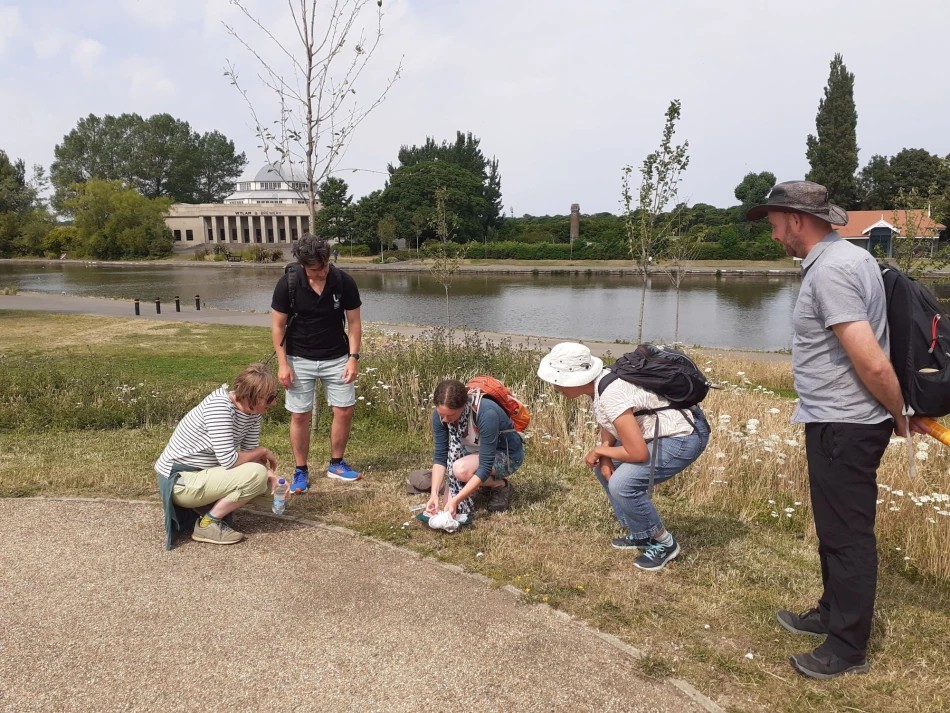New Citywide Partnership Awarded £701,417 to Improve Pollinator Habitats Across Newcastle upon Tyne

A new citywide partnership led by charity Urban Green Newcastle has been awarded £701,417 from Defra and The National Lottery Heritage Fund to develop and improve pollinator pathways across Newcastle upon Tyne.
Newcastle’s Nature Networks (NNN), which comprises Urban Green Newcastle, Natural History Society of Northumbria, Newcastle City Council, Northumberland Wildlife Trust, Northumbria University, Ouseburn Farm, Ouseburn Trust, and Scotswood Garden, received the grant funding from The Species Survival Fund; a partnership between Defra and The National Lottery Heritage Fund to support habitat creation and restoration projects across England.
The Species Survival Fund will help halt and reverse the decline in species abundance by preserving vital habitats. The new funding is supporting projects that tackle habitat loss, safeguard fragile ecosystems, and create and restore nature-rich landscapes full of wildlife-friendly habitats within precious chalk streams, wetlands, heathlands, grasslands and scrublands.
In Newcastle upon Tyne, habitat improvements will create and restore 41 green spaces across public parks, nature reserves and previously developed land, to support the growth of pollinator species across the city.
Barbara Hooper, Director of Parks at Urban Green Newcastle, said: “Pollinators – such as birds, bees, butterflies, and other small mammals – are essential to our ecosystem. They support plant life, wildlife populations, and our entire natural world.
“The funding from the Species Survival Fund will allow Newcastle’s Nature Networks to create new, connected wildlife-rich habitats across the city that allow pollinators to thrive. From our public parks and local nature reserves to woodland and local wildlife sites, this project will help create a greener city by increasing pollinator numbers and improving biodiversity. It will also create new green jobs and hundreds of volunteer opportunities; providing local people with the chance to learn new skills in ecology and horticulture.
“Newcastle’s Nature Networks is a fantastic example of partnership working across the city. Each of the eight organisations brings a unique set of skills, and this project provides a real opportunity to work collaboratively to drive positive change for nature and biodiversity. It will boost wildlife habitats across the city and improve people’s access to nature, which has been proven to support better health and wellbeing.”
The Species Survival Fund will create and improve natural habitats, helping Defra to meet its target to protect 30% of land for nature by 2030 (known as 30by30).
The Species Survival Fund builds upon the success of similar initiatives like the Green Recovery Challenge Fund and will create the foundations for ongoing expansion of habitats to support wildlife. Urban Green Newcastle - working in partnership with Northumberland Wildlife Trust - was awarded £697,800 from the Green Recovery Challenge Fund in 2021 to deliver Beelines North East. The two-year project helped create 45 nectar-rich public sites, plant 2,500 trees and 25,000 bulbs, and deliver 18 hectares of grassland.
Eilish McGuinness, Chief Executive, The National Lottery Heritage Fund, said: "We are delighted to be working in partnership with Defra again to distribute funding for these projects, which will support nature recovery by helping to boost the quality and quantity of wildlife-rich habitats across England. This partnership will further our vision for heritage to be valued, cared for and sustained for everyone, now and in the future.”
Rebecca Pow MP, Environment Minister, said: “The funding awarded today as part our flagship Species Survival Fund will enable local authorities, landowners, farmers, and our protected landscapes organisations to restore nature at scale and provide valuable green jobs in the process.
“Only by creating bigger and better habitats for wildlife will we be able to halt the alarming decline in species loss. This fund will be a key plank in achieving our legally binding targets to halt species loss and protect 30% land for nature by 2030.”
Clare Freeman, Director, Natural History Society of Northumbria, said: “I am delighted to be working with Urban Green Newcastle and other partners to improve habitats at Gosforth Nature Reserve. This funding will be especially appreciated by our committed volunteers who work so hard to protect the wildlife, and share the wonders of wildlife with visitors.”
Cllr Marion Williams, Cabinet member for a Connected, Clean City at Newcastle City Council, said: “We all want Newcastle to be a clean, green, healthy city where nature and wildlife thrives, so I am pleased the partnership has been awarded this funding.
“Looking after our environment is paramount as it plays a crucial role in our health and wellbeing and is our best protection against climate change.
“This funding will enable partners to build on the important work we all do to support nature recovery and ensure habitats for wildlife are protected and enhanced, now and in the future.”
Catherine Kirkham, Northumberland Wildlife Trust Fundraising Manager, said: “Fifteen hundred species of insects pollinate plants in the UK including bumble bees, honeybees, solitary bees, hoverflies, wasps, flies, beetles, butterflies and moths, but their number are in drastic decline. Without such pollinators, the whole ecology of the country could slow down, as many species of wild plants are entirely dependent on insects for their survival.
“It goes without saying therefore that we are delighted that that this much valued funding will enable our team of staff and volunteers to undertake vital conservation on our three urban sites: St Nicholas Park, Fencerhill Wood and Big Waters to ensure a promising future.”
Dr Katherine Baldock, an ecologist at Northumbria University, said: “I’m delighted that Northumbria can play a part in the Newcastle's Nature Networks project which aims to transform urban green spaces across the city for biodiversity.
“This is a fantastic opportunity to increase the habitat quality of our urban parks and we look forward to assessing the benefits for plants and pollinating insects including bees and hoverflies. Nature-rich urban green spaces are vital for functioning ecosystems, and also provide opportunities for people to connect with nature on their doorsteps.”
Hugh Stolliday, Manager of Ouseburn Farm, said: "This is a fantastic opportunity for a range of great partners to work together to improve the environment for pollinators. Here at Ouseburn Farm, we're acutely aware of the central role that pollinators play in the successful production of food - and we're really looking forward to getting involved in this project and seeing what can be achieved."
Chris Barnard, Ouseburn Trust's Chief Officer, said: “Ouseburn Trust are thrilled to be a part of this partnership which will enable us to work together for the benefit of nature across the city. The Lower Ouseburn Valley is a very special place, shaped by it's industrial past and now flourishing again thanks to creative organisations, independent venues and new homes.
“At the heart of this are its blue and green spaces and the wildlife they support, and we are excited to have the opportunity to grow this remarkable patchwork of habitats which exist right on people's doorsteps.”
Karen Dobson, CEO at Scotswood Garden, said: "We are thrilled to be part of this project. It's fantastic news for nature across Newcastle."
This project is funded by the Government's Species Survival Fund. The fund was developed by Defra and its Arm's-Length Bodies. It is being delivered by The National Lottery Heritage Fund in partnership with Natural England and the Environment Agency.
Image: Newcastle’s Nature Networks will develop and improve pollinator pathways across Newcastle upon Tyne



